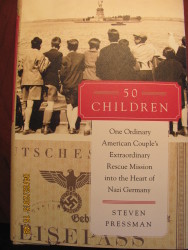A remarkable rescue mission
 Recently, I finished reading a book about a remarkable rescue mission. Titled 50 Children: One Ordinary Couple’s Extraordinary Rescue Mission into the Heart of Nazi Germany, it was written by Steven Pressman, husband of the rescuers’ grandchild.
Recently, I finished reading a book about a remarkable rescue mission. Titled 50 Children: One Ordinary Couple’s Extraordinary Rescue Mission into the Heart of Nazi Germany, it was written by Steven Pressman, husband of the rescuers’ grandchild.
It is the story of Gil and Eleanor Kraus, a wealthy Philadelphia couple, who left behind a comfortable life in order to venture into Nazi Germany and Austria in order to rescue Jewish children.
The book is partly about a “Sophie’s choice”–parents having to decide which child was to be saved and, at the same time, realizing that they may never see their child again. It is partly about the bravery of an American Jewish couple, who leave their own children behind in Pennsylvania, knowing that they themselves may be imprisoned by the Germans. But, for me, the most interesting–and shocking–revelations in the book are those dealing with America’s unknowing complicity in the death of so many innocent people once the Holocaust began.
Being a Holocaust survivor myself, and one who escaped post-war Communism, I once had a utopian picture of America as the world’s last bastion of freedom–one where all people were treated equally, where immigrants were welcome, and where everyone had an equal opportunity to succeed. 50 Children, other books, and even today’s xenophobia, have taught me otherwise, particularly about America’s past. Pre-WWII America was isolationist, as well as anti-Semitic. The German-American Bund was Hitler’s propaganda arm in this country. And the anti-immigrant, particularly anti-Jewish, attitude was pervasive throughout the federal government, especially the State Department.
Of course, everyone (except Holocaust deniers) knows that the Germans murdered six million Jews and several million other innocent souls. However, it takes a book such as 50 Children to inform that, in the late 1930s, the Nazis were not yet killing Jews–they wanted them to leave the country. The problem was that no one wanted them. The US allotted a very small number of visas to Jews, and anti-Semites in the State Department slowed down the process such that even those tiny quotas were not filled.
The Kraus’ fought against this bureaucracy and prejudice, and, with the aid of a couple of sympathetic American diplomats, were able to obtain 50 visas for 50 Viennese children, whom they brought to the US. It was an amazing accomplishment in light of the barriers posed by both German and American obstructionists. The extraordinary story is told in the book in a way that is concise and fast-moving. Despite the fact that one suspects a happy ending, suspense keeps the reader turning pages.
I breathed a sigh of relief when the children arrived in America. Yet, when I closed the book, I had to ponder the fact that only 50 children were saved. More than one million kids were murdered in the Holocaust. How many more could have lived if only the US and other countries had opened their hearts and their doors?